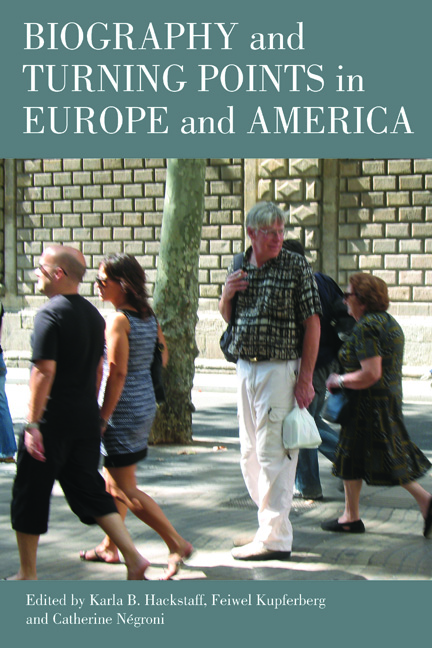Book contents
- Frontmatter
- Contents
- Notes on contributors
- Introduction: Advancing the dialogue on turning points
- one Unpacking biographical narratives: investigating stories of artistic careers in Northern Jutland, Denmark
- two Turning points in the life course: a narrative concept in professional bifurcations
- three Conjugal separation and immigration in the life course of immigrant single mothers in Québec
- four Migration biography and ethnic identity: on the discontinuity of biographical experience and how turning points affect the ethnicisation of biography
- five Biographical structuring through a critical life event: parental loss during childhood
- six Decisive turning points in life trajectories of violence among young men in the barrios of Caracas: the initiation and biographical reconversion to non-violent lifestyles
- seven The turning points of the single life course in Budapest, Hungary
- eight Complicating actions and complicated lives: raising questions about narrative theory through an exploration of lesbian lives
- nine Religious conversion as a biographical turn/ing: the case of Orthodox believers in contemporary Russia
- ten Conclusion: theorising turning points and decoding narratives
- Index
five - Biographical structuring through a critical life event: parental loss during childhood
Published online by Cambridge University Press: 01 September 2022
- Frontmatter
- Contents
- Notes on contributors
- Introduction: Advancing the dialogue on turning points
- one Unpacking biographical narratives: investigating stories of artistic careers in Northern Jutland, Denmark
- two Turning points in the life course: a narrative concept in professional bifurcations
- three Conjugal separation and immigration in the life course of immigrant single mothers in Québec
- four Migration biography and ethnic identity: on the discontinuity of biographical experience and how turning points affect the ethnicisation of biography
- five Biographical structuring through a critical life event: parental loss during childhood
- six Decisive turning points in life trajectories of violence among young men in the barrios of Caracas: the initiation and biographical reconversion to non-violent lifestyles
- seven The turning points of the single life course in Budapest, Hungary
- eight Complicating actions and complicated lives: raising questions about narrative theory through an exploration of lesbian lives
- nine Religious conversion as a biographical turn/ing: the case of Orthodox believers in contemporary Russia
- ten Conclusion: theorising turning points and decoding narratives
- Index
Summary
Introduction
Critical life events such as the loss of a job, the end of a relationship or a divorce or, as discussed in this chapter, the passing of a parent, are often accompanied by depression, melancholy, disorientation and loss of perspective on life. It is the concept of critical life events in particular that is a predictor of psychological anomalies. As a general rule, a critical life event condenses the experience and takes the affected person into a stadium of ‘relative imbalance’ (Filipp, 1981, p 24; Inglehart, 1991), therefore requiring the person to reorganise his or her behaviour and experience making as a consequence of the painful event. However, coping with such a critical life situation not only depends on a person's psychological disposition, but also on the event's biographical and social circumstances. This aspect is emphasised in sociological concepts dedicated to ‘turning points’ (Strauss, 1997), which stress the coping process. The notion of ‘turning points’ includes the idea that major changes to one's life situation also have a subjective effect on one's biographical construction methods. Accounts are clearly divided into ‘then’ and ‘now’, thereby having a decisive influence on the organisation of memories and on the structure of the presented life story.
In his book Mirrors and masks, Strauss (1997, 2nd edn) points out different turning points that can lead to a new way of taking stock of reality, assessing it and understanding it anew. However, Strauss primarily focuses on turning point experiences made during adulthood. He discusses events such as migration, regulated status passages in organisations or religious conversions, which people need to assess and, in turn, may lead to new patterns of orientation and understanding. Now, studying life events experienced during childhood can contribute to a better understanding of these ‘turning points’, since children usually have a different range of action and a protracted sense of time compared to adults. Also, a child's (core) identity is still in the developmental stage, making conditions for transformation different. The focus of this chapter lies in the process of coping with such a major event such as the loss of a parent during childhood and the consequences this has on a person's life thereafter.
- Type
- Chapter
- Information
- Biography and Turning Points in Europe and America , pp. 125 - 142Publisher: Bristol University PressPrint publication year: 2012



